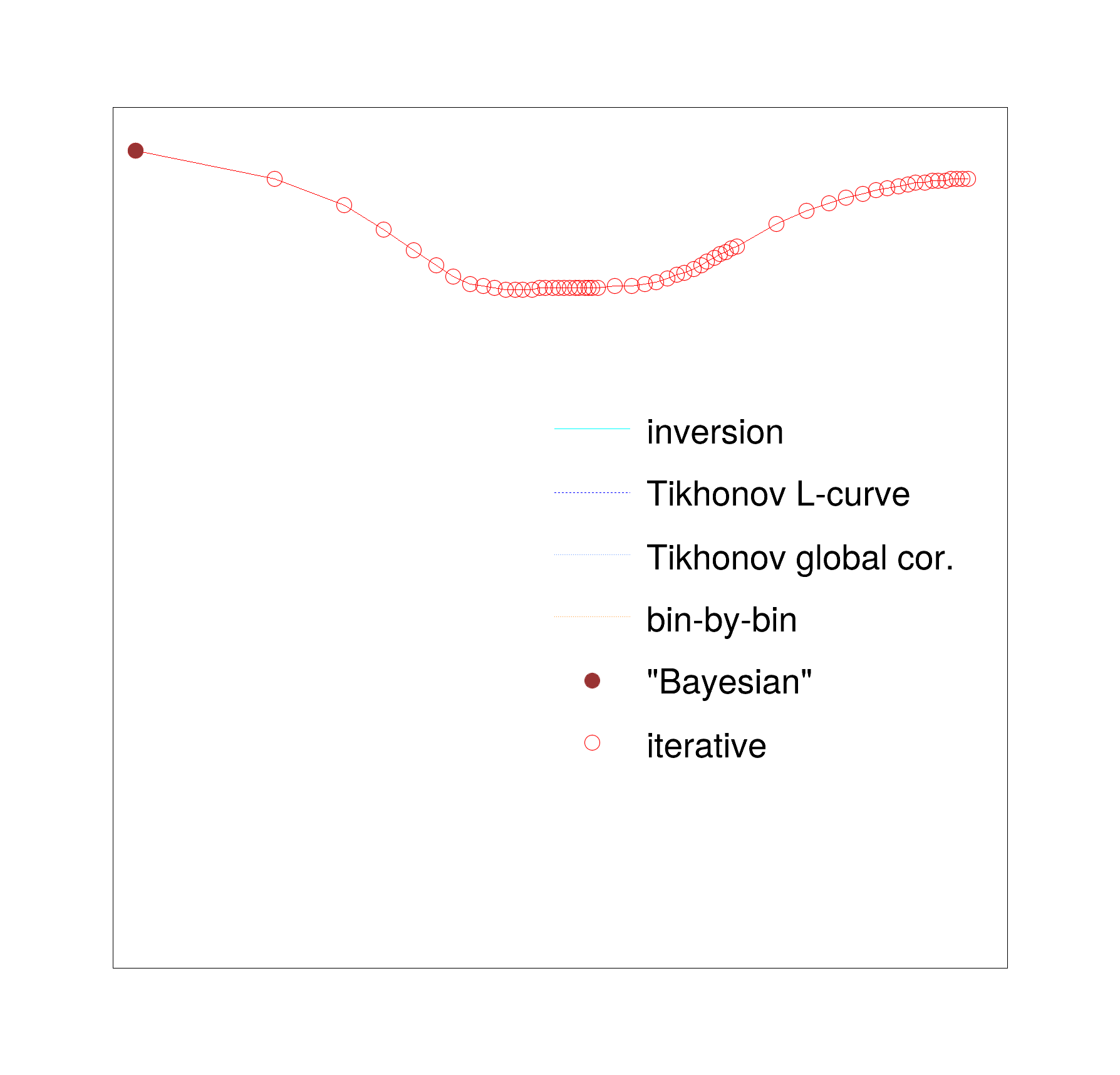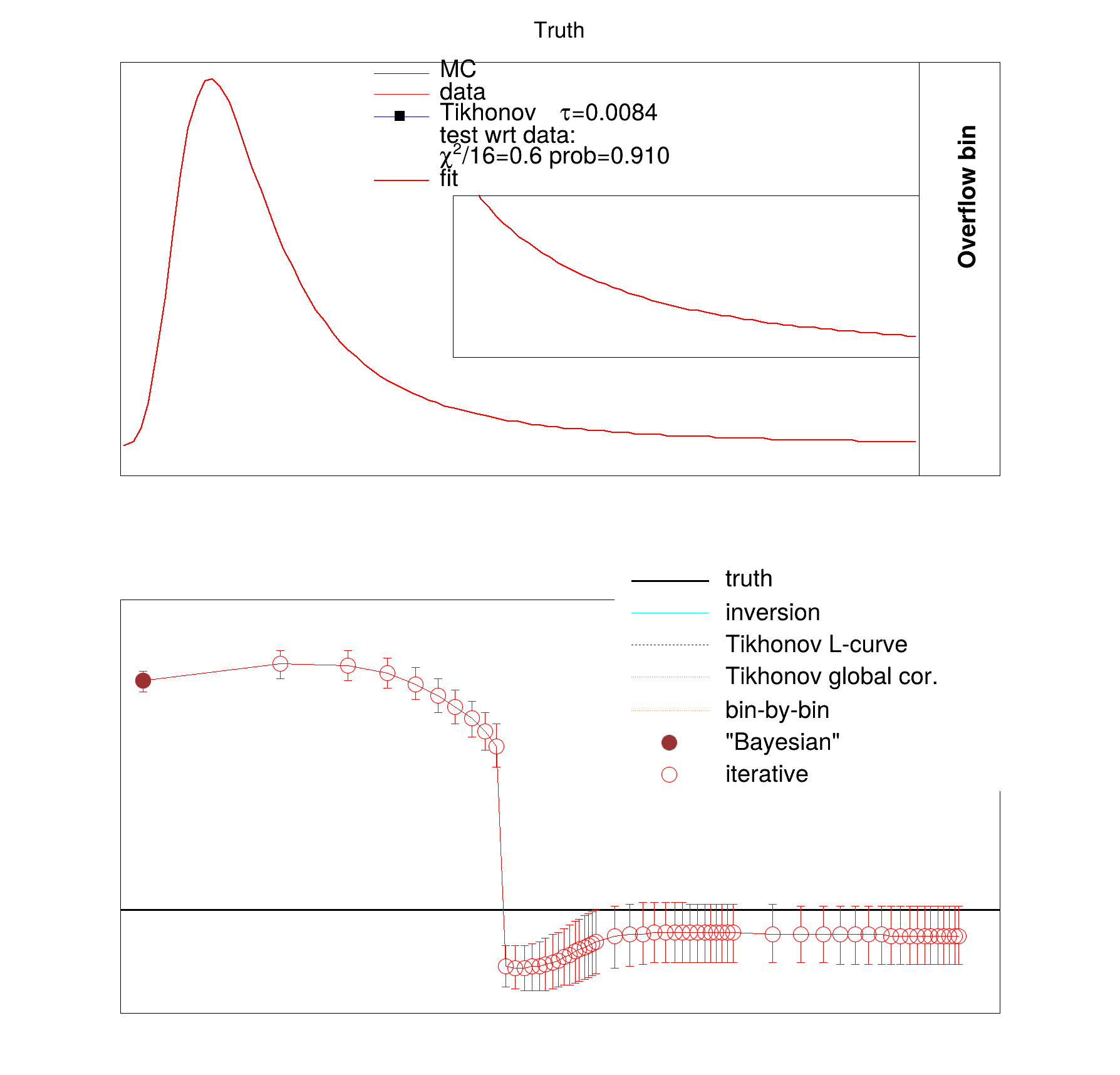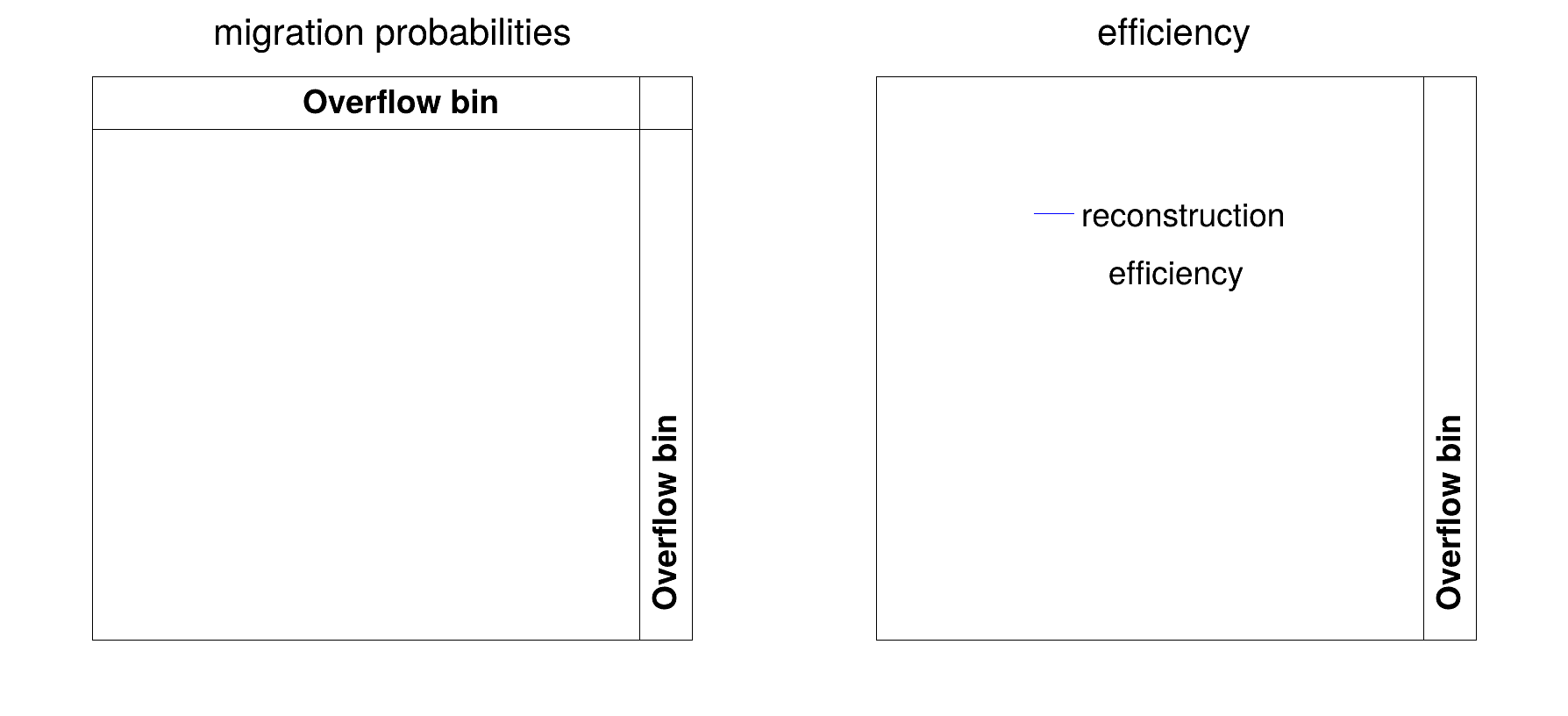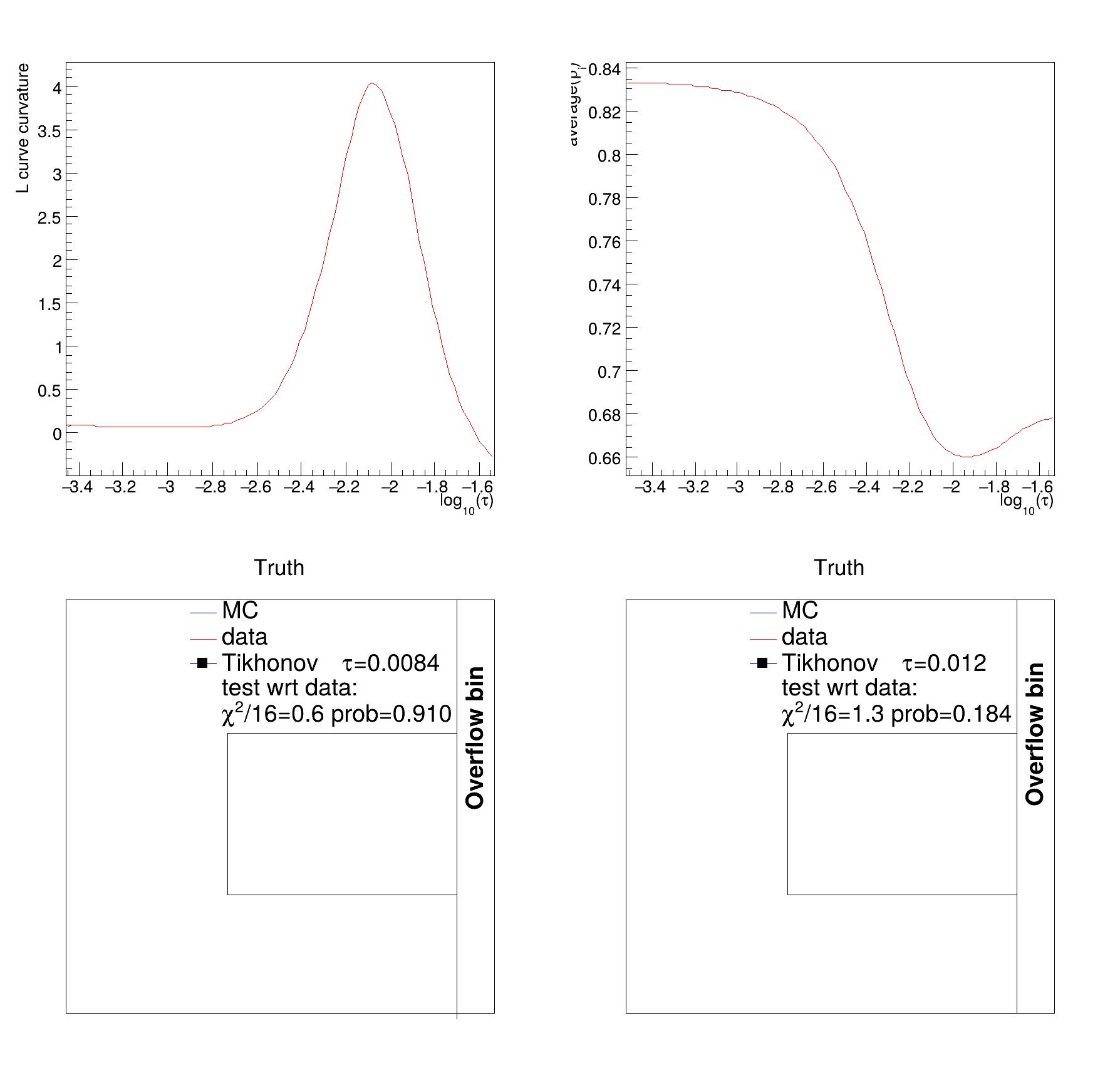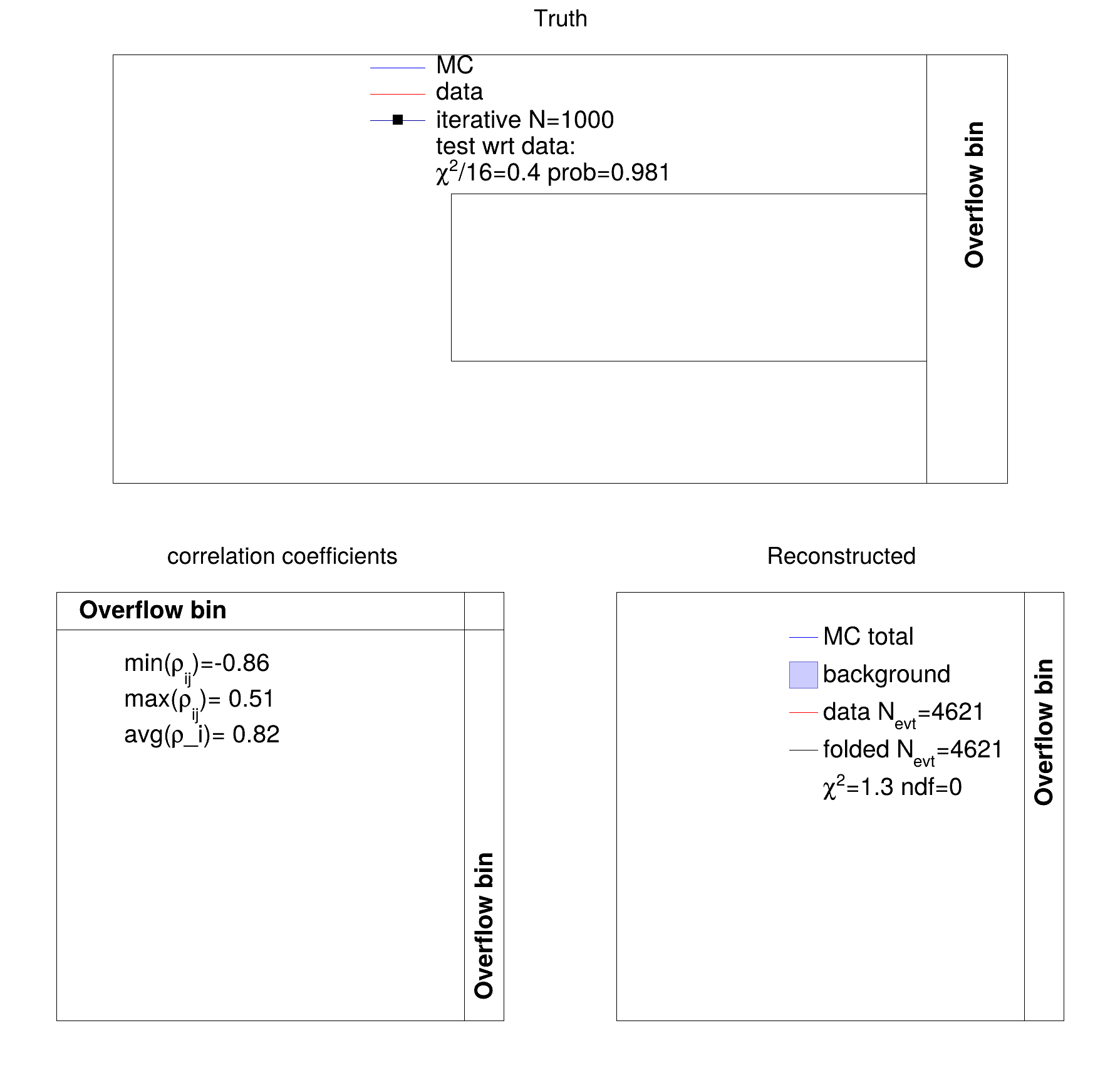arXiv:1611.01927 12th Conference on Quark Confinement and the Hadron Spectrum (Confinement XII)
This is an example of unfolding a one-dimensional distribution. It compares various unfolding methods:
XII Quark Confinement and the Hadron Spectrum 29.8. - 3.9.2016 Thessaloniki, Greece statictics session (+proceedings)
maximum number of iterations: 1000
0
100
200
300
400
500
600
700
800
900
1000
histOutputCtau0_binwU
****************************************
Minimizer is Minuit2 / Migrad
MinFCN = 8.93341
NDf = 0
Edm = 2.94432e-07
NCalls = 119
p0 = 2313.03 +/- 81.4707 -80.0337 +82.9445 (Minos)
p1 = 6.07588 +/- 0.0843195 -0.0839209 +0.0847407 (Minos)
p2 = 1.76119 +/- 0.0622688 -0.0617262 +0.0628078 (Minos)
fcn flag=0: npar=3 gin=0 par=[ 2313.03 6.07588 1.76119]
histOutputFtau0_binwU
****************************************
Minimizer is Minuit2 / Migrad
MinFCN = 8.33089
NDf = 0
Edm = 6.50812e-08
NCalls = 119
p0 = 2292.59 +/- 77.1869 -75.9067 +78.5004 (Minos)
p1 = 6.0667 +/- 0.0821746 -0.0817803 +0.0825885 (Minos)
p2 = 1.77123 +/- 0.0599625 -0.0594568 +0.0604685 (Minos)
fcn flag=0: npar=3 gin=0 par=[ 2292.59 6.0667 1.77123]
histOutputFAtau0_binwU
****************************************
Minimizer is Minuit2 / Migrad
MinFCN = 8.36913
NDf = 0
Edm = 4.1629e-08
NCalls = 119
p0 = 2300.96 +/- 77.0613 -75.7926 +78.3631 (Minos)
p1 = 6.06894 +/- 0.0818049 -0.0814136 +0.0822153 (Minos)
p2 = 1.77403 +/- 0.0597178 -0.0592155 +0.0602208 (Minos)
fcn flag=0: npar=3 gin=0 par=[ 2300.96 6.06894 1.77403]
histOutputFALCurve_binwU
****************************************
Minimizer is Minuit2 / Migrad
MinFCN = 22.1459
NDf = 0
Edm = 4.72718e-08
NCalls = 123
p0 = 2175.69 +/- 63.3586 -62.8717 +63.8248 (Minos)
p1 = 6.01392 +/- 0.0830555 -0.08261 +0.08352 (Minos)
p2 = 1.88219 +/- 0.0523609 -0.0516227 +0.0531036 (Minos)
fcn flag=0: npar=3 gin=0 par=[ 2175.69 6.01392 1.88219]
histOutputFArho_binwU
****************************************
Minimizer is Minuit2 / Migrad
MinFCN = 36.4398
NDf = 0
Edm = 8.28607e-06
NCalls = 122
p0 = 2088.52 +/- 54.3348 -54.0383 +54.6064 (Minos)
p1 = 5.94814 +/- 0.0813071 -0.0810537 +0.0815775 (Minos)
p2 = 1.96606 +/- 0.0470327 -0.0463947 +0.0476727 (Minos)
fcn flag=0: npar=3 gin=0 par=[ 2088.52 5.94814 1.96606]
histOutputBBBO
bad global correlation 8 -2.22045e-16
****************************************
Minimizer is Minuit2 / Migrad
MinFCN = 19.0585
NDf = 0
Edm = 1.0184e-08
NCalls = 102
p0 = 1963.05 +/- 51.5682 -51.2648 +51.8646 (Minos)
p1 = 5.90214 +/- 0.0816763 -0.0809708 +0.0824027 (Minos)
p2 = 2.07111 +/- 0.0460756 -0.045646 +0.0465268 (Minos)
fcn flag=0: npar=3 gin=0 par=[ 1963.05 5.90214 2.07111]
histOutputAgorep0
****************************************
Minimizer is Minuit2 / Migrad
MinFCN = 197.953
NDf = 0
Edm = 5.71447e-06
NCalls = 101
p0 = 1707.06 +/- 30.628 -30.6773 +30.5555 (Minos)
p1 = 5.62399 +/- 0.0532142 -0.052652 +0.0537917 (Minos)
p2 = 2.24364 +/- 0.020155 -0.0199327 +0.0203847 (Minos)
fcn flag=0: npar=3 gin=0 par=[ 1707.06 5.62399 2.24364]
histOutputAgorep1
****************************************
Minimizer is Minuit2 / Migrad
MinFCN = 118.197
NDf = 0
Edm = 7.06309e-08
NCalls = 120
p0 = 1766.67 +/- 33.976 -33.9516 +33.9857 (Minos)
p1 = 5.8135 +/- 0.0699476 -0.0693366 +0.0706199 (Minos)
p2 = 2.27527 +/- 0.0262139 -0.0259602 +0.0264935 (Minos)
fcn flag=0: npar=3 gin=0 par=[ 1766.67 5.8135 2.27527]
histOutputAgorep2
****************************************
Minimizer is Minuit2 / Migrad
MinFCN = 103.621
NDf = 0
Edm = 1.74226e-07
NCalls = 123
p0 = 1794.2 +/- 35.0632 -35.0418 +35.0726 (Minos)
p1 = 5.89902 +/- 0.0771589 -0.0765447 +0.077804 (Minos)
p2 = 2.27417 +/- 0.0289737 -0.028679 +0.0292851 (Minos)
fcn flag=0: npar=3 gin=0 par=[ 1794.2 5.89902 2.27417]
histOutputAgorep3
****************************************
Minimizer is Minuit2 / Migrad
MinFCN = 96.8081
NDf = 0
Edm = 2.93973e-06
NCalls = 119
p0 = 1816.25 +/- 35.9125 -35.9098 +35.9051 (Minos)
p1 = 5.93729 +/- 0.0805321 -0.0799526 +0.0811401 (Minos)
p2 = 2.25889 +/- 0.0305052 -0.0301629 +0.0308666 (Minos)
fcn flag=0: npar=3 gin=0 par=[ 1816.25 5.93729 2.25889]
histOutputAgorep4
****************************************
Minimizer is Minuit2 / Migrad
MinFCN = 91.6257
NDf = 0
Edm = 5.08799e-07
NCalls = 123
p0 = 1836.74 +/- 36.7459 -36.7349 +36.7473 (Minos)
p1 = 5.9568 +/- 0.0823367 -0.0816809 +0.0830262 (Minos)
p2 = 2.2385 +/- 0.0316079 -0.0312164 +0.0320162 (Minos)
fcn flag=0: npar=3 gin=0 par=[ 1836.74 5.9568 2.2385]
histOutputAgorep5
****************************************
Minimizer is Minuit2 / Migrad
MinFCN = 86.8941
NDf = 0
Edm = 5.19992e-07
NCalls = 120
p0 = 1856.65 +/- 37.6417 -37.6077 +37.665 (Minos)
p1 = 5.96958 +/- 0.0835144 -0.082935 +0.0841269 (Minos)
p2 = 2.2164 +/- 0.0326294 -0.0322428 +0.0330273 (Minos)
fcn flag=0: npar=3 gin=0 par=[ 1856.65 5.96958 2.2164]
histOutputAgorep6
****************************************
Minimizer is Minuit2 / Migrad
MinFCN = 82.3357
NDf = 0
Edm = 3.22307e-07
NCalls = 115
p0 = 1876.57 +/- 38.6709 -38.6446 +38.6871 (Minos)
p1 = 5.98002 +/- 0.0844752 -0.0837658 +0.0852298 (Minos)
p2 = 2.1935 +/- 0.0337655 -0.0333551 +0.0341892 (Minos)
fcn flag=0: npar=3 gin=0 par=[ 1876.57 5.98002 2.1935]
histOutputAgorep7
****************************************
Minimizer is Minuit2 / Migrad
MinFCN = 77.8736
NDf = 0
Edm = 2.18856e-07
NCalls = 116
p0 = 1896.9 +/- 39.939 -39.8492 +40.0236 (Minos)
p1 = 5.99052 +/- 0.0854688 -0.0847383 +0.0862587 (Minos)
p2 = 2.16994 +/- 0.0352059 -0.0348797 +0.035563 (Minos)
fcn flag=0: npar=3 gin=0 par=[ 1896.9 5.99052 2.16994]
histOutputAgorep8
****************************************
Minimizer is Minuit2 / Migrad
MinFCN = 73.4731
NDf = 0
Edm = 7.26758e-08
NCalls = 103
p0 = 1918.35 +/- 41.6429 -41.4587 +41.8498 (Minos)
p1 = 6.0021 +/- 0.0867252 -0.0858723 +0.0876869 (Minos)
p2 = 2.14524 +/- 0.0372357 -0.0371887 +0.0374098 (Minos)
fcn flag=0: npar=3 gin=0 par=[ 1918.35 6.0021 2.14524]
histOutputAgorep9
****************************************
Minimizer is Minuit2 / Migrad
MinFCN = 69.0987
NDf = 0
Edm = 5.25891e-08
NCalls = 140
p0 = 1941.89 +/- 44.2607 -43.7871 +44.9422 (Minos)
p1 = 6.01603 +/- 0.0887007 -0.0875698 +0.0901215 (Minos)
p2 = 2.11836 +/- 0.0405096 -0.0414649 +0.0401739 (Minos)
fcn flag=0: npar=3 gin=0 par=[ 1941.89 6.01603 2.11836]
histOutputAgorep10
****************************************
Minimizer is Minuit2 / Migrad
MinFCN = 42.5138
NDf = 0
Edm = 5.85033e-07
NCalls = 131
p0 = 2382.79 +/- 63.0985 -63.4333 +62.8409 (Minos)
p1 = 6.23206 +/- 0.0749671 -0.0743234 +0.07562 (Minos)
p2 = 1.6911 +/- 0.0410841 -0.0398794 +0.0425078 (Minos)
fcn flag=0: npar=3 gin=0 par=[ 2382.79 6.23206 1.6911]
histOutputAgorep11
****************************************
Minimizer is Minuit2 / Migrad
MinFCN = 38.7947
NDf = 0
Edm = 3.1702e-08
NCalls = 115
p0 = 2389.25 +/- 65.1256 -65.6257 +64.7417 (Minos)
p1 = 6.21773 +/- 0.0753106 -0.0746172 +0.0760137 (Minos)
p2 = 1.6883 +/- 0.0428048 -0.0413996 +0.0444921 (Minos)
fcn flag=0: npar=3 gin=0 par=[ 2389.25 6.21773 1.6883]
histOutputAgorep12
****************************************
Minimizer is Minuit2 / Migrad
MinFCN = 35.7239
NDf = 0
Edm = 5.37905e-07
NCalls = 98
p0 = 2392.49 +/- 67.1401 -67.7426 +66.6974 (Minos)
p1 = 6.20537 +/- 0.0756438 -0.0750129 +0.0762805 (Minos)
p2 = 1.68766 +/- 0.0446165 -0.0430544 +0.0465276 (Minos)
fcn flag=0: npar=3 gin=0 par=[ 2392.49 6.20537 1.68766]
histOutputAgorep13
****************************************
Minimizer is Minuit2 / Migrad
MinFCN = 33.1305
NDf = 0
Edm = 4.98975e-09
NCalls = 108
p0 = 2393.31 +/- 69.1408 -69.9609 +68.5385 (Minos)
p1 = 6.19428 +/- 0.0759759 -0.0752988 +0.0766601 (Minos)
p2 = 1.68865 +/- 0.0464989 -0.0447029 +0.048734 (Minos)
fcn flag=0: npar=3 gin=0 par=[ 2393.31 6.19428 1.68865]
histOutputAgorep14
****************************************
Minimizer is Minuit2 / Migrad
MinFCN = 30.8966
NDf = 0
Edm = 2.30646e-08
NCalls = 113
p0 = 2392.11 +/- 71.1208 -72.1391 +70.3889 (Minos)
p1 = 6.18428 +/- 0.0763225 -0.075653 +0.0769982 (Minos)
p2 = 1.691 +/- 0.0484382 -0.0464172 +0.0509987 (Minos)
fcn flag=0: npar=3 gin=0 par=[ 2392.11 6.18428 1.691]
histOutputAgorep15
****************************************
Minimizer is Minuit2 / Migrad
MinFCN = 28.9404
NDf = 0
Edm = 1.4588e-05
NCalls = 101
p0 = 2389.62 +/- 73.0541 -74.5329 +71.9485 (Minos)
p1 = 6.17486 +/- 0.0766853 -0.0758192 +0.0775703 (Minos)
p2 = 1.69423 +/- 0.0503883 -0.0479924 +0.0534617 (Minos)
fcn flag=0: npar=3 gin=0 par=[ 2389.62 6.17486 1.69423]
histOutputAgorep16
****************************************
Minimizer is Minuit2 / Migrad
MinFCN = 27.2043
NDf = 0
Edm = 2.00745e-08
NCalls = 108
p0 = 2385.53 +/- 74.9256 -76.3679 +73.9118 (Minos)
p1 = 6.1665 +/- 0.0770866 -0.076446 +0.0777358 (Minos)
p2 = 1.69854 +/- 0.052353 -0.0498695 +0.0555839 (Minos)
fcn flag=0: npar=3 gin=0 par=[ 2385.53 6.1665 1.69854]
histOutputAgorep17
****************************************
Minimizer is Minuit2 / Migrad
MinFCN = 25.6479
NDf = 0
Edm = 7.49305e-06
NCalls = 98
p0 = 2381.07 +/- 76.6574 -78.4476 +75.3746 (Minos)
p1 = 6.15856 +/- 0.0775109 -0.0769802 +0.0780537 (Minos)
p2 = 1.70313 +/- 0.0542145 -0.0514552 +0.0578389 (Minos)
fcn flag=0: npar=3 gin=0 par=[ 2381.07 6.15856 1.70313]
histOutputAgorep18
****************************************
Minimizer is Minuit2 / Migrad
MinFCN = 24.2424
NDf = 0
Edm = 3.51473e-08
NCalls = 109
p0 = 2375.84 +/- 78.2406 -79.9679 +77.018 (Minos)
p1 = 6.15095 +/- 0.0779577 -0.0773953 +0.0785384 (Minos)
p2 = 1.70817 +/- 0.055982 -0.0531101 +0.0597242 (Minos)
fcn flag=0: npar=3 gin=0 par=[ 2375.84 6.15095 1.70817]
histOutputAgorep19
****************************************
Minimizer is Minuit2 / Migrad
MinFCN = 22.9669
NDf = 0
Edm = 7.96352e-08
NCalls = 107
p0 = 2370.62 +/- 79.5865 -81.3434 +78.3158 (Minos)
p1 = 6.14388 +/- 0.0784175 -0.0779004 +0.0789615 (Minos)
p2 = 1.71318 +/- 0.0575408 -0.0545378 +0.061404 (Minos)
fcn flag=0: npar=3 gin=0 par=[ 2370.62 6.14388 1.71318]
histOutputAgorep20
****************************************
Minimizer is Minuit2 / Migrad
MinFCN = 21.8061
NDf = 0
Edm = 6.90996e-08
NCalls = 109
p0 = 2365.46 +/- 80.6738 -82.3344 +79.4269 (Minos)
p1 = 6.13724 +/- 0.0788756 -0.0783743 +0.0794136 (Minos)
p2 = 1.71809 +/- 0.0588664 -0.0558061 +0.0627092 (Minos)
fcn flag=0: npar=3 gin=0 par=[ 2365.46 6.13724 1.71809]
histOutputAgorep21
****************************************
Minimizer is Minuit2 / Migrad
MinFCN = 20.7482
NDf = 0
Edm = 3.60576e-08
NCalls = 108
p0 = 2360.59 +/- 81.4757 -82.9796 +80.2862 (Minos)
p1 = 6.13112 +/- 0.0793164 -0.0788597 +0.0798191 (Minos)
p2 = 1.72273 +/- 0.05992 -0.0568573 +0.0636503 (Minos)
fcn flag=0: npar=3 gin=0 par=[ 2360.59 6.13112 1.72273]
histOutputAgorep22
****************************************
Minimizer is Minuit2 / Migrad
MinFCN = 19.7836
NDf = 0
Edm = 1.67419e-07
NCalls = 106
p0 = 2356.12 +/- 81.9995 -83.2875 +80.9154 (Minos)
p1 = 6.1255 +/- 0.0797259 -0.0793155 +0.0801896 (Minos)
p2 = 1.72699 +/- 0.0606994 -0.0576875 +0.0642428 (Minos)
fcn flag=0: npar=3 gin=0 par=[ 2356.12 6.1255 1.72699]
histOutputAgorep23
****************************************
Minimizer is Minuit2 / Migrad
MinFCN = 18.9042
NDf = 0
Edm = 7.23017e-07
NCalls = 108
p0 = 2352.05 +/- 82.2803 -83.2445 +81.4023 (Minos)
p1 = 6.12036 +/- 0.0800955 -0.0797097 +0.0805351 (Minos)
p2 = 1.73088 +/- 0.0612334 -0.0583585 +0.0644839 (Minos)
fcn flag=0: npar=3 gin=0 par=[ 2352.05 6.12036 1.73088]
histOutputAgorep24
****************************************
Minimizer is Minuit2 / Migrad
MinFCN = 18.1027
NDf = 0
Edm = 1.12284e-06
NCalls = 108
p0 = 2348.51 +/- 82.3552 -83.0365 +81.6583 (Minos)
p1 = 6.11569 +/- 0.0804179 -0.08004 +0.0808515 (Minos)
p2 = 1.73431 +/- 0.0615464 -0.0588188 +0.0645108 (Minos)
fcn flag=0: npar=3 gin=0 par=[ 2348.51 6.11569 1.73431]
histOutputAgorep25
****************************************
Minimizer is Minuit2 / Migrad
MinFCN = 17.3722
NDf = 0
Edm = 2.4526e-07
NCalls = 109
p0 = 2345.48 +/- 82.275 -82.7168 +81.7297 (Minos)
p1 = 6.11149 +/- 0.0806932 -0.0803289 +0.0811141 (Minos)
p2 = 1.73731 +/- 0.0616846 -0.0591194 +0.0643657 (Minos)
fcn flag=0: npar=3 gin=0 par=[ 2345.48 6.11149 1.73731]
histOutputAgorep30
****************************************
Minimizer is Minuit2 / Migrad
MinFCN = 14.582
NDf = 0
Edm = 1.0438e-07
NCalls = 108
p0 = 2335.86 +/- 80.7919 -80.3191 +81.0186 (Minos)
p1 = 6.09634 +/- 0.0815191 -0.0811746 +0.0819027 (Minos)
p2 = 1.74717 +/- 0.0609954 -0.0592501 +0.0625777 (Minos)
fcn flag=0: npar=3 gin=0 par=[ 2335.86 6.09634 1.74717]
histOutputAgorep35
****************************************
Minimizer is Minuit2 / Migrad
MinFCN = 12.8045
NDf = 0
Edm = 9.34012e-08
NCalls = 98
p0 = 2331.88 +/- 79.1862 -78.3522 +79.82 (Minos)
p1 = 6.08782 +/- 0.081828 -0.0814668 +0.0822162 (Minos)
p2 = 1.75171 +/- 0.0597919 -0.0585402 +0.0608655 (Minos)
fcn flag=0: npar=3 gin=0 par=[ 2331.88 6.08782 1.75171]
histOutputAgorep40
****************************************
Minimizer is Minuit2 / Migrad
MinFCN = 11.6423
NDf = 0
Edm = 1.02018e-05
NCalls = 100
p0 = 2330.29 +/- 78.0177 -77.0108 +78.86 (Minos)
p1 = 6.08294 +/- 0.0819366 -0.0815303 +0.0823707 (Minos)
p2 = 1.75394 +/- 0.0588235 -0.057927 +0.0595514 (Minos)
fcn flag=0: npar=3 gin=0 par=[ 2330.29 6.08294 1.75394]
histOutputAgorep45
****************************************
Minimizer is Minuit2 / Migrad
MinFCN = 10.8611
NDf = 0
Edm = 1.95297e-08
NCalls = 101
p0 = 2329.76 +/- 77.1875 -76.1446 +78.1275 (Minos)
p1 = 6.08016 +/- 0.0819698 -0.0815648 +0.0823947 (Minos)
p2 = 1.75487 +/- 0.0580944 -0.0572715 +0.0588007 (Minos)
fcn flag=0: npar=3 gin=0 par=[ 2329.76 6.08016 1.75487]
histOutputAgorep50
****************************************
Minimizer is Minuit2 / Migrad
MinFCN = 10.3233
NDf = 0
Edm = 4.24138e-08
NCalls = 101
p0 = 2329.68 +/- 76.6148 -75.5421 +77.6124 (Minos)
p1 = 6.07856 +/- 0.0819664 -0.0815546 +0.0823986 (Minos)
p2 = 1.75534 +/- 0.0575737 -0.056851 +0.0582026 (Minos)
fcn flag=0: npar=3 gin=0 par=[ 2329.68 6.07856 1.75534]
histOutputAgorep55
****************************************
Minimizer is Minuit2 / Migrad
MinFCN = 9.94615
NDf = 0
Edm = 7.72081e-06
NCalls = 97
p0 = 2329.82 +/- 76.2151 -75.1493 +77.2088 (Minos)
p1 = 6.07766 +/- 0.0819447 -0.0814959 +0.0824191 (Minos)
p2 = 1.75557 +/- 0.0571982 -0.0565833 +0.0577231 (Minos)
fcn flag=0: npar=3 gin=0 par=[ 2329.82 6.07766 1.75557]
histOutputAgorep60
****************************************
Minimizer is Minuit2 / Migrad
MinFCN = 9.67782
NDf = 0
Edm = 7.72101e-08
NCalls = 103
p0 = 2329.99 +/- 75.9094 -74.8089 +76.9693 (Minos)
p1 = 6.07728 +/- 0.0819216 -0.0815055 +0.0823564 (Minos)
p2 = 1.75556 +/- 0.0569057 -0.0562971 +0.0574508 (Minos)
fcn flag=0: npar=3 gin=0 par=[ 2329.99 6.07728 1.75556]
histOutputAgorep65
****************************************
Minimizer is Minuit2 / Migrad
MinFCN = 9.48518
NDf = 0
Edm = 6.83294e-09
NCalls = 104
p0 = 2330.24 +/- 75.6898 -74.6008 +76.7488 (Minos)
p1 = 6.07715 +/- 0.0818931 -0.0814768 +0.0823276 (Minos)
p2 = 1.75548 +/- 0.0566882 -0.0560956 +0.0572289 (Minos)
fcn flag=0: npar=3 gin=0 par=[ 2330.24 6.07715 1.75548]
histOutputAgorep70
****************************************
Minimizer is Minuit2 / Migrad
MinFCN = 9.34625
NDf = 0
Edm = 7.40461e-09
NCalls = 104
p0 = 2330.47 +/- 75.5249 -74.4325 +76.5957 (Minos)
p1 = 6.0772 +/- 0.0818641 -0.0814448 +0.0823013 (Minos)
p2 = 1.75538 +/- 0.0565213 -0.055952 +0.0570466 (Minos)
fcn flag=0: npar=3 gin=0 par=[ 2330.47 6.0772 1.75538]
histOutputAgorep75
****************************************
Minimizer is Minuit2 / Migrad
MinFCN = 9.24613
NDf = 0
Edm = 3.60651e-06
NCalls = 90
p0 = 2330.57 +/- 75.3959 -74.1813 +76.6033 (Minos)
p1 = 6.07746 +/- 0.081838 -0.0815121 +0.0821732 (Minos)
p2 = 1.75534 +/- 0.0563932 -0.0559364 +0.0568083 (Minos)
fcn flag=0: npar=3 gin=0 par=[ 2330.57 6.07746 1.75534]
histOutputAgorep80
****************************************
Minimizer is Minuit2 / Migrad
MinFCN = 9.17445
NDf = 0
Edm = 2.32805e-08
NCalls = 108
p0 = 2330.9 +/- 75.3033 -74.2008 +76.397 (Minos)
p1 = 6.0776 +/- 0.0818089 -0.0813833 +0.0822519 (Minos)
p2 = 1.7551 +/- 0.0562883 -0.0557547 +0.0567898 (Minos)
fcn flag=0: npar=3 gin=0 par=[ 2330.9 6.0776 1.7551]
histOutputAgorep85
****************************************
Minimizer is Minuit2 / Migrad
MinFCN = 9.12391
NDf = 0
Edm = 9.66783e-06
NCalls = 97
p0 = 2330.9 +/- 75.2171 -73.9318 +76.523 (Minos)
p1 = 6.07794 +/- 0.081787 -0.0814075 +0.082173 (Minos)
p2 = 1.75504 +/- 0.0562036 -0.0557696 +0.0566162 (Minos)
fcn flag=0: npar=3 gin=0 par=[ 2330.9 6.07794 1.75504]
histOutputAgorep90
****************************************
Minimizer is Minuit2 / Migrad
MinFCN = 9.0892
NDf = 0
Edm = 3.80927e-08
NCalls = 105
p0 = 2331.28 +/- 75.1734 -74.086 +76.2571 (Minos)
p1 = 6.07819 +/- 0.0817594 -0.0813249 +0.0822118 (Minos)
p2 = 1.75479 +/- 0.0561416 -0.0556206 +0.0566372 (Minos)
fcn flag=0: npar=3 gin=0 par=[ 2331.28 6.07819 1.75479]
histOutputAgorep95
****************************************
Minimizer is Minuit2 / Migrad
MinFCN = 9.06651
NDf = 0
Edm = 7.61055e-07
NCalls = 104
p0 = 2331.46 +/- 75.1317 -74.0559 +76.2015 (Minos)
p1 = 6.07855 +/- 0.0817372 -0.0813378 +0.0821527 (Minos)
p2 = 1.75465 +/- 0.0560907 -0.0555865 +0.0565685 (Minos)
fcn flag=0: npar=3 gin=0 par=[ 2331.46 6.07855 1.75465]
histOutputAgorep100
****************************************
Minimizer is Minuit2 / Migrad
MinFCN = 9.05296
NDf = 0
Edm = 1.02031e-05
NCalls = 98
p0 = 2331.55 +/- 75.0899 -73.9714 +76.2204 (Minos)
p1 = 6.07861 +/- 0.0817142 -0.0810451 +0.0824076 (Minos)
p2 = 1.75449 +/- 0.0560425 -0.0555293 +0.0565429 (Minos)
fcn flag=0: npar=3 gin=0 par=[ 2331.55 6.07861 1.75449]
histOutputAgorep150
****************************************
Minimizer is Minuit2 / Migrad
MinFCN = 9.12732
NDf = 0
Edm = 3.08834e-10
NCalls = 109
p0 = 2332.43 +/- 75.0022 -73.894 +76.1246 (Minos)
p1 = 6.08166 +/- 0.0815863 -0.0811589 +0.0820312 (Minos)
p2 = 1.75329 +/- 0.0558779 -0.0554108 +0.0563366 (Minos)
fcn flag=0: npar=3 gin=0 par=[ 2332.43 6.08166 1.75329]
histOutputAgorep200
****************************************
Minimizer is Minuit2 / Migrad
MinFCN = 9.27969
NDf = 0
Edm = 1.61096e-07
NCalls = 111
p0 = 2332.8 +/- 75.0377 -73.8959 +76.1994 (Minos)
p1 = 6.08337 +/- 0.0815398 -0.0811157 +0.0819812 (Minos)
p2 = 1.75248 +/- 0.0558583 -0.055423 +0.0562881 (Minos)
fcn flag=0: npar=3 gin=0 par=[ 2332.8 6.08337 1.75248]
histOutputAgorep250
****************************************
Minimizer is Minuit2 / Migrad
MinFCN = 9.41695
NDf = 0
Edm = 2.24257e-08
NCalls = 110
p0 = 2333.07 +/- 75.0859 -73.9573 +76.2347 (Minos)
p1 = 6.08433 +/- 0.0815362 -0.081113 +0.081977 (Minos)
p2 = 1.75185 +/- 0.0558629 -0.055419 +0.0563031 (Minos)
fcn flag=0: npar=3 gin=0 par=[ 2333.07 6.08433 1.75185]
histOutputAgorep300
****************************************
Minimizer is Minuit2 / Migrad
MinFCN = 9.53327
NDf = 0
Edm = 6.87797e-08
NCalls = 110
p0 = 2333.25 +/- 75.1273 -73.9901 +76.2857 (Minos)
p1 = 6.08484 +/- 0.081555 -0.0811333 +0.0819944 (Minos)
p2 = 1.75138 +/- 0.0558714 -0.0554358 +0.0563036 (Minos)
fcn flag=0: npar=3 gin=0 par=[ 2333.25 6.08484 1.75138]
histOutputAgorep350
****************************************
Minimizer is Minuit2 / Migrad
MinFCN = 9.63207
NDf = 0
Edm = 1.47821e-07
NCalls = 110
p0 = 2333.38 +/- 75.1608 -74.0152 +76.328 (Minos)
p1 = 6.08509 +/- 0.0815844 -0.0811639 +0.0820226 (Minos)
p2 = 1.75103 +/- 0.0558793 -0.0554515 +0.0563036 (Minos)
fcn flag=0: npar=3 gin=0 par=[ 2333.38 6.08509 1.75103]
histOutputAgorep400
****************************************
Minimizer is Minuit2 / Migrad
MinFCN = 9.71683
NDf = 0
Edm = 2.36995e-07
NCalls = 110
p0 = 2333.48 +/- 75.1872 -74.0346 +76.3617 (Minos)
p1 = 6.08518 +/- 0.0816173 -0.0811977 +0.0820549 (Minos)
p2 = 1.75075 +/- 0.0558861 -0.0554647 +0.0563037 (Minos)
fcn flag=0: npar=3 gin=0 par=[ 2333.48 6.08518 1.75075]
histOutputAgorep450
****************************************
Minimizer is Minuit2 / Migrad
MinFCN = 9.7902
NDf = 0
Edm = 3.13329e-07
NCalls = 110
p0 = 2333.55 +/- 75.2079 -74.0499 +76.388 (Minos)
p1 = 6.08518 +/- 0.0816499 -0.0812307 +0.0820871 (Minos)
p2 = 1.75054 +/- 0.0558917 -0.0554751 +0.0563043 (Minos)
fcn flag=0: npar=3 gin=0 par=[ 2333.55 6.08518 1.75054]
histOutputAgorep500
****************************************
Minimizer is Minuit2 / Migrad
MinFCN = 9.85409
NDf = 0
Edm = 3.63948e-07
NCalls = 110
p0 = 2333.59 +/- 75.2241 -74.0622 +76.4083 (Minos)
p1 = 6.08512 +/- 0.08168 -0.081261 +0.0821172 (Minos)
p2 = 1.75037 +/- 0.0558964 -0.055483 +0.0563054 (Minos)
fcn flag=0: npar=3 gin=0 par=[ 2333.59 6.08512 1.75037]
histOutputAgorep550
****************************************
Minimizer is Minuit2 / Migrad
MinFCN = 9.90995
NDf = 0
Edm = 3.86269e-07
NCalls = 110
p0 = 2333.62 +/- 75.2368 -74.0722 +76.4239 (Minos)
p1 = 6.08502 +/- 0.0817068 -0.0812877 +0.082144 (Minos)
p2 = 1.75025 +/- 0.0559002 -0.0554888 +0.0563071 (Minos)
fcn flag=0: npar=3 gin=0 par=[ 2333.62 6.08502 1.75025]
histOutputAgorep600
****************************************
Minimizer is Minuit2 / Migrad
MinFCN = 9.95893
NDf = 0
Edm = 3.84226e-07
NCalls = 110
p0 = 2333.62 +/- 75.247 -74.0806 +76.4358 (Minos)
p1 = 6.08492 +/- 0.08173 -0.0813106 +0.0821674 (Minos)
p2 = 1.75015 +/- 0.0559032 -0.0554929 +0.056309 (Minos)
fcn flag=0: npar=3 gin=0 par=[ 2333.62 6.08492 1.75015]
histOutputAgorep650
****************************************
Minimizer is Minuit2 / Migrad
MinFCN = 10.0019
NDf = 0
Edm = 3.64514e-07
NCalls = 110
p0 = 2333.62 +/- 75.2551 -74.0877 +76.445 (Minos)
p1 = 6.08481 +/- 0.0817498 -0.0813301 +0.0821875 (Minos)
p2 = 1.75008 +/- 0.0559055 -0.0554956 +0.0563109 (Minos)
fcn flag=0: npar=3 gin=0 par=[ 2333.62 6.08481 1.75008]
histOutputAgorep700
****************************************
Minimizer is Minuit2 / Migrad
MinFCN = 10.0397
NDf = 0
Edm = 3.34042e-07
NCalls = 110
p0 = 2333.61 +/- 75.2616 -74.0938 +76.4522 (Minos)
p1 = 6.0847 +/- 0.0817665 -0.0813465 +0.0822047 (Minos)
p2 = 1.75002 +/- 0.0559072 -0.0554971 +0.0563128 (Minos)
fcn flag=0: npar=3 gin=0 par=[ 2333.61 6.0847 1.75002]
histOutputAgorep750
****************************************
Minimizer is Minuit2 / Migrad
MinFCN = 10.0729
NDf = 0
Edm = 2.9859e-07
NCalls = 110
p0 = 2333.59 +/- 75.2671 -74.0991 +76.4578 (Minos)
p1 = 6.0846 +/- 0.0817807 -0.0813602 +0.0822193 (Minos)
p2 = 1.74997 +/- 0.0559083 -0.0554977 +0.0563144 (Minos)
fcn flag=0: npar=3 gin=0 par=[ 2333.59 6.0846 1.74997]
histOutputAgorep800
****************************************
Minimizer is Minuit2 / Migrad
MinFCN = 10.1021
NDf = 0
Edm = 2.62333e-07
NCalls = 110
p0 = 2333.57 +/- 75.2717 -74.1039 +76.4624 (Minos)
p1 = 6.0845 +/- 0.0817927 -0.0813717 +0.0822317 (Minos)
p2 = 1.74993 +/- 0.0559088 -0.0554975 +0.0563156 (Minos)
fcn flag=0: npar=3 gin=0 par=[ 2333.57 6.0845 1.74993]
histOutputAgorep850
****************************************
Minimizer is Minuit2 / Migrad
MinFCN = 10.1277
NDf = 0
Edm = 2.27907e-07
NCalls = 110
p0 = 2333.54 +/- 75.2758 -74.1082 +76.4661 (Minos)
p1 = 6.08441 +/- 0.0818029 -0.0813815 +0.0822424 (Minos)
p2 = 1.74989 +/- 0.0559088 -0.0554968 +0.0563164 (Minos)
fcn flag=0: npar=3 gin=0 par=[ 2333.54 6.08441 1.74989]
histOutputAgorep900
****************************************
Minimizer is Minuit2 / Migrad
MinFCN = 10.1502
NDf = 0
Edm = 1.96724e-07
NCalls = 110
p0 = 2333.52 +/- 75.2793 -74.1122 +76.4694 (Minos)
p1 = 6.08433 +/- 0.0818116 -0.0813897 +0.0822515 (Minos)
p2 = 1.74986 +/- 0.0559084 -0.0554956 +0.0563168 (Minos)
fcn flag=0: npar=3 gin=0 par=[ 2333.52 6.08433 1.74986]
histOutputAgorep950
****************************************
Minimizer is Minuit2 / Migrad
MinFCN = 10.17
NDf = 0
Edm = 1.69332e-07
NCalls = 110
p0 = 2333.5 +/- 75.2825 -74.1158 +76.4722 (Minos)
p1 = 6.08426 +/- 0.081819 -0.0813967 +0.0822593 (Minos)
p2 = 1.74983 +/- 0.0559076 -0.0554941 +0.0563169 (Minos)
fcn flag=0: npar=3 gin=0 par=[ 2333.5 6.08426 1.74983]
histOutputAgorep1000
****************************************
Minimizer is Minuit2 / Migrad
MinFCN = 10.1874
NDf = 0
Edm = 1.45744e-07
NCalls = 110
p0 = 2333.49 +/- 75.2855 -74.1192 +76.4748 (Minos)
p1 = 6.08419 +/- 0.0818254 -0.0814028 +0.0822661 (Minos)
p2 = 1.7498 +/- 0.0559066 -0.0554924 +0.0563165 (Minos)
fcn flag=0: npar=3 gin=0 par=[ 2333.49 6.08419 1.7498]
"inversion",0.369615,16,0.989,0.687185,13,0.777954,0.843936,6.07588,"±",0.0843195,1.76119,"±",0.0622688
"template",0.220299,16,0.99951,0.640838,13,0.821395,0.834923,6.0667,"±",0.0821746,1.77123,"±",0.0599625
"template+area",0.237251,16,0.999212,0.643779,13,0.818749,0.834905,6.06894,"±",0.0818049,1.77403,"±",0.0597178
"Tikhonov+area",0.567834,16,0.909857,1.70353,13,0.0531425,0.666522,6.01392,"±",0.0830555,1.88219,"±",0.0523609
"min(rhomax)",1.30367,16,0.184004,2.80306,13,0.000506874,0.656519,5.94814,"±",0.0813071,1.96606,"±",0.0470327
"bin-by-bin",4.925,16,2.7358e-10,1.46604,13,0.121301,0,5.90214,"±",0.0816763,2.07111,"±",0.0460756
"iterative, N=0",319.06,16,0,15.2271,13,3.5961e-35,0.849481,5.62399,"±",0.0532142,2.24364,"±",0.020155
"iterative, N=1",111.402,16,0,9.09211,13,4.5692e-19,0.817166,5.8135,"±",0.0699476,2.27527,"±",0.0262139
"iterative, N=2",62.992,16,2.31021e-204,7.97086,13,3.28626e-16,0.785917,5.89902,"±",0.0771589,2.27417,"±",0.0289737
"iterative, N=3",41.9938,16,1.22802e-132,7.44678,13,6.87329e-15,0.757593,5.93729,"±",0.0805321,2.25889,"±",0.0305052
"iterative, N=4",30.3819,16,2.83616e-93,7.04813,13,6.82474e-14,0.733895,5.9568,"±",0.0823367,2.2385,"±",0.0316079
"iterative, N=5",23.0971,16,8.57418e-69,6.68416,13,5.46969e-13,0.715893,5.96958,"±",0.0835144,2.2164,"±",0.0326294
"iterative, N=6",18.1625,16,2.24797e-52,6.33352,13,4.0031e-12,0.703607,5.98002,"±",0.0844752,2.1935,"±",0.0337655
"iterative, N=7",14.6425,16,8.54613e-41,5.99028,13,2.76604e-11,0.696048,5.99052,"±",0.0854688,2.16994,"±",0.0352059
"iterative, N=8",12.0361,16,2.49723e-32,5.65178,13,1.83018e-10,0.691821,6.0021,"±",0.0867252,2.14524,"±",0.0372357
"iterative, N=9",10.0504,16,5.68598e-26,5.31529,13,1.17568e-09,0.6897,6.01603,"±",0.0887007,2.11836,"±",0.0405096
"iterative, N=10",8.50328,16,4.25835e-21,3.27029,13,5.39585e-05,0.688825,6.23206,"±",0.0749671,1.6911,"±",0.0410841
"iterative, N=11",7.27553,16,2.68544e-17,2.98421,13,0.000215602,0.688651,6.21773,"±",0.0753106,1.6883,"±",0.0428048
"iterative, N=12",6.28618,16,2.69801e-14,2.74799,13,0.000654782,0.688847,6.20537,"±",0.0756438,1.68766,"±",0.0446165
"iterative, N=13",5.47848,16,6.74681e-12,2.5485,13,0.00162879,0.689213,6.19428,"±",0.0759759,1.68865,"±",0.0464989
"iterative, N=14",4.81161,16,5.78501e-10,2.37666,13,0.00349095,0.68963,6.18428,"±",0.0763225,1.691,"±",0.0484382
"iterative, N=15",4.25556,16,2.15151e-08,2.22618,13,0.00667463,0.690033,6.17486,"±",0.0766853,1.69423,"±",0.0503883
"iterative, N=16",3.78782,16,4.13727e-07,2.09264,13,0.0116635,0.690388,6.1665,"±",0.0770866,1.69854,"±",0.052353
"iterative, N=17",3.3913,16,4.70074e-06,1.97292,13,0.0189482,0.690682,6.15856,"±",0.0775109,1.70313,"±",0.0542145
"iterative, N=18",3.05275,16,3.49724e-05,1.8648,13,0.0289726,0.690913,6.15095,"±",0.0779577,1.70817,"±",0.055982
"iterative, N=19",2.76185,16,0.000184579,1.76668,13,0.0420756,0.691087,6.14388,"±",0.0784175,1.71318,"±",0.0575408
"iterative, N=20",2.51042,16,0.000736128,1.67739,13,0.0584402,0.691212,6.13724,"±",0.0788756,1.71809,"±",0.0588664
"iterative, N=21",2.29192,16,0.00233267,1.59601,13,0.0780608,0.691301,6.13112,"±",0.0793164,1.72273,"±",0.05992
"iterative, N=22",2.10111,16,0.00611486,1.52182,13,0.100738,0.691362,6.1255,"±",0.0797259,1.72699,"±",0.0606994
"iterative, N=23",1.93369,16,0.0136996,1.45417,13,0.126103,0.691407,6.12036,"±",0.0800955,1.73088,"±",0.0612334
"iterative, N=24",1.78617,16,0.0269367,1.39251,13,0.15366,0.691446,6.11569,"±",0.0804179,1.73431,"±",0.0615464
"iterative, N=25",1.65566,16,0.0475044,1.33632,13,0.182842,0.691486,6.11149,"±",0.0806932,1.73731,"±",0.0616846
"iterative, N=30",1.18689,16,0.269169,1.12169,13,0.334167,0.691931,6.09634,"±",0.0815191,1.74717,"±",0.0609954
"iterative, N=35",0.908322,16,0.559059,0.984963,13,0.463022,0.69311,6.08782,"±",0.081828,1.75171,"±",0.0597919
"iterative, N=40",0.732607,16,0.762905,0.895559,13,0.557174,0.695148,6.08294,"±",0.0819366,1.75394,"±",0.0588235
"iterative, N=45",0.616619,16,0.873537,0.835466,13,0.622456,0.69795,6.08016,"±",0.0819698,1.75487,"±",0.0580944
"iterative, N=50",0.537326,16,0.92907,0.794103,13,0.667304,0.701338,6.07856,"±",0.0819664,1.75534,"±",0.0575737
"iterative, N=55",0.481626,16,0.95714,0.765088,13,0.698332,0.705124,6.07766,"±",0.0819447,1.75557,"±",0.0571982
"iterative, N=60",0.441666,16,0.971955,0.744448,13,0.720044,0.709144,6.07728,"±",0.0819216,1.75556,"±",0.0569057
"iterative, N=65",0.412534,16,0.980214,0.729629,13,0.735393,0.713267,6.07715,"±",0.0818931,1.75548,"±",0.0566882
"iterative, N=70",0.391042,16,0.985078,0.718942,13,0.746319,0.717396,6.0772,"±",0.0818641,1.75538,"±",0.0565213
"iterative, N=75",0.375056,16,0.988086,0.71124,13,0.754111,0.72146,6.07746,"±",0.081838,1.75534,"±",0.0563932
"iterative, N=80",0.363112,16,0.990023,0.705727,13,0.759644,0.725414,6.0776,"±",0.0818089,1.7551,"±",0.0562883
"iterative, N=85",0.354178,16,0.991311,0.701839,13,0.763522,0.729226,6.07794,"±",0.081787,1.75504,"±",0.0562036
"iterative, N=90",0.347516,16,0.992188,0.699169,13,0.766174,0.732878,6.07819,"±",0.0817594,1.75479,"±",0.0561416
"iterative, N=95",0.342588,16,0.992792,0.697424,13,0.767902,0.736361,6.07855,"±",0.0817372,1.75465,"±",0.0560907
"iterative, N=100",0.338996,16,0.99321,0.696382,13,0.768932,0.739673,6.07861,"±",0.0817142,1.75449,"±",0.0560425
"iterative, N=150",0.335268,16,0.993624,0.702102,13,0.763261,0.764528,6.08166,"±",0.0815863,1.75329,"±",0.0558779
"iterative, N=200",0.346127,16,0.992362,0.713822,13,0.751507,0.779298,6.08337,"±",0.0815398,1.75248,"±",0.0558583
"iterative, N=250",0.356914,16,0.990931,0.724381,13,0.740775,0.788781,6.08433,"±",0.0815362,1.75185,"±",0.0558629
"iterative, N=300",0.36599,16,0.989579,0.733328,13,0.731582,0.795305,6.08484,"±",0.081555,1.75138,"±",0.0558714
"iterative, N=350",0.373445,16,0.988362,0.740928,13,0.723709,0.800037,6.08509,"±",0.0815844,1.75103,"±",0.0558793
"iterative, N=400",0.379583,16,0.987284,0.747449,13,0.71691,0.803611,6.08518,"±",0.0816173,1.75075,"±",0.0558861
"iterative, N=450",0.384672,16,0.986336,0.753092,13,0.710994,0.806396,6.08518,"±",0.0816499,1.75054,"±",0.0558917
"iterative, N=500",0.388923,16,0.985505,0.758007,13,0.705821,0.808621,6.08512,"±",0.08168,1.75037,"±",0.0558964
"iterative, N=550",0.3925,16,0.984779,0.762304,13,0.701281,0.810434,6.08502,"±",0.0817068,1.75025,"±",0.0559002
"iterative, N=600",0.395528,16,0.984143,0.766072,13,0.697289,0.811937,6.08492,"±",0.08173,1.75015,"±",0.0559032
"iterative, N=650",0.398104,16,0.983588,0.76938,13,0.693776,0.813199,6.08481,"±",0.0817498,1.75008,"±",0.0559055
"iterative, N=700",0.400304,16,0.983103,0.772286,13,0.690683,0.814272,6.0847,"±",0.0817665,1.75002,"±",0.0559072
"iterative, N=750",0.40219,16,0.982678,0.77484,13,0.687961,0.815194,6.0846,"±",0.0817807,1.74997,"±",0.0559083
"iterative, N=800",0.403812,16,0.982307,0.777084,13,0.685565,0.815995,6.0845,"±",0.0817927,1.74993,"±",0.0559088
"iterative, N=850",0.40521,16,0.981983,0.779056,13,0.683458,0.816697,6.08441,"±",0.0818029,1.74989,"±",0.0559088
"iterative, N=900",0.406417,16,0.9817,0.780788,13,0.681605,0.817318,6.08433,"±",0.0818116,1.74986,"±",0.0559084
"iterative, N=950",0.407463,16,0.981452,0.78231,13,0.679975,0.817871,6.08426,"±",0.081819,1.74983,"±",0.0559076
"iterative, N=1000",0.408369,16,0.981235,0.783648,13,0.678541,0.818368,6.08419,"±",0.0818254,1.7498,"±",0.0559066


